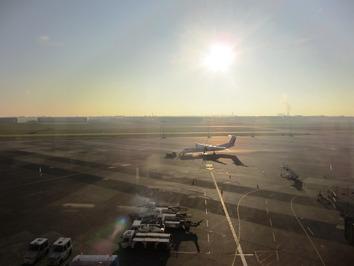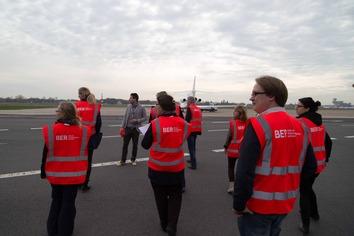Soft Parts – Social Determinants of Security and Safety at Airports (completed)
Disaster Research Unit (DRU)
BMBF (Federal Ministry of Education and Research)
Project number: 13N12669
Consortium:
FU Berlin – Disaster Research Unit (Coordination)
University of Potsdam – Faculty of Economic and Social Sciences
Technical University Berlin - Department of Aeronautics and Astronautics (ILR)
Subproject: Training and learning within “high-reliability organizations” (HRO), networks and critical infrastructures

Airports manifest themselves as relevant hubs for international flows of people and goods, which is to say, as critical infrastructures. Disruptions of whichever kind can result in global effects and repercussions, necessitating an extraordinary level of security. This security can, however, only be produced locally through a complex array of social and technical subsystems.
Within security research and current concepts of security, social factors have so far only played a negligible role; the focus usually lies on technical and logistical systems and formal laws and regulations. Their efficacy however is critically dependent on which informal structures of communication, cooperation and coordination develop informally in addition to such formal structures, e.g.:
- Which relations of trust or mistrust develop between the actors involved
- How accepted regulations, technologies, and processes are by security personnel as well as customers
- How motivated the security personnel operates, in consideration of working conditions, legal and formal frameworks, and latent or open conflicts


Airfield of the airport Hannover-Langenhagen (l.) and airport survey at Berlin Tegel (r.).
Source: DRU
The production of security – and therefore the level of security – is therefore based mostly on factors that result out of the social interaction of all those involved in the production process. This interaction occurs on the level of organizations at the airport as well as on the level of individual staff, and their contact to those being controlled, i.e. the passengers as well as persons working at airports and external companies.
At the center of this research is the education and further training of the security staff. Our project is based on the assumption that the local security regime of German airports has changed as markedly as the global security regime has.
The focus of our research lies on communication and learning processes at airports as “High Reliability Organizations” (HROs). Both work motivation and the acceptance of regulations, as two key conditions of successful communication and learning, are elucidated from the perspective of ergonomics (in the wider sense).
The research is divided into eight work packages, with the DRU working on packages four through six. As part of WP 4, an analysis of the currently existing education and training concepts was carried out, researching which assumptions of reality underlie them implicitly or explicitly. Afterwards, two quantitative surveys (WP 5 and 6) were designed and undertaken to ascertain the real social causes of the production of safety and security at the airport. The results from WPs 4, 5 and 6, in tandem with the working projects 1, 2, 3 and 7 – undertaken by research partners – form the empirical foundation for the manual produced as part of WP 8. The manual is designed to improve concepts for education and training, as well as aid in improving communications within the network of security production at the airport.
Links (in German):
Downloads (in German):